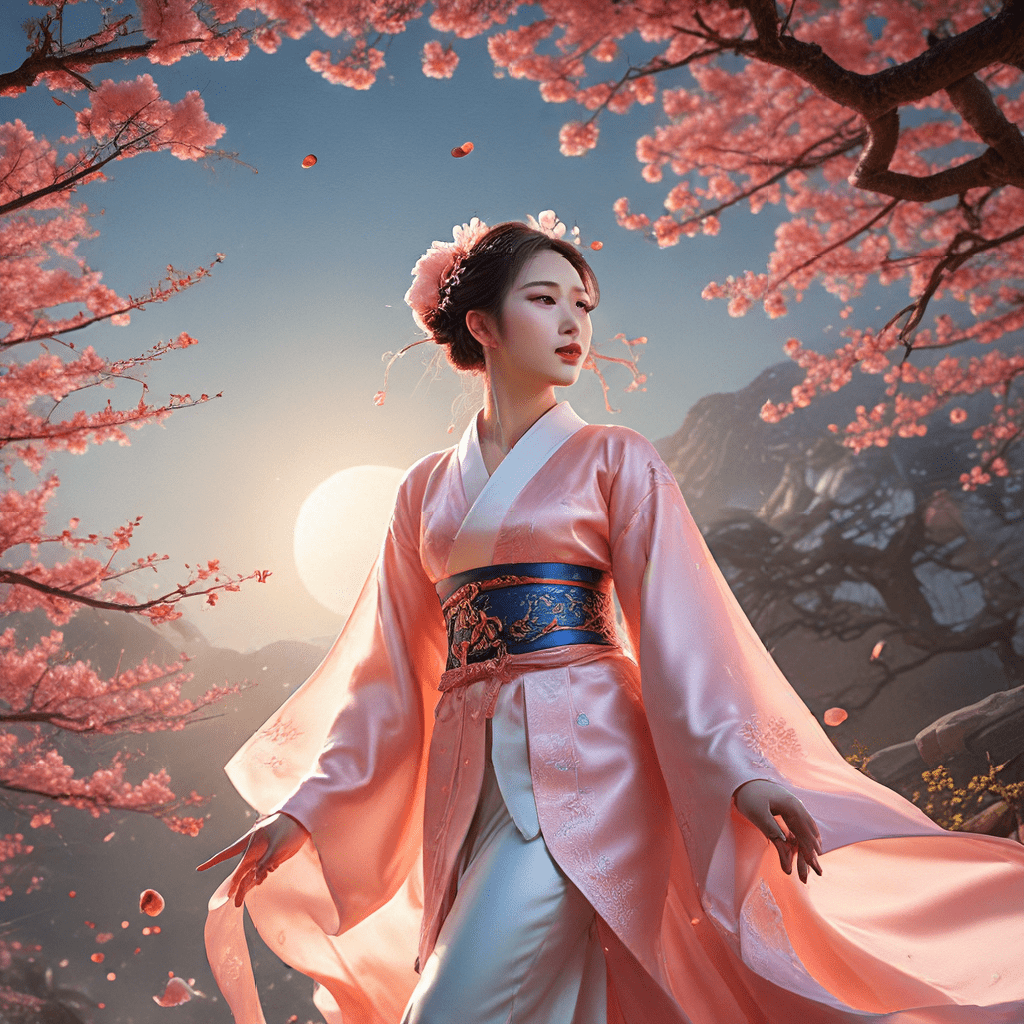Korean Legends: The Secret of the Heavenly Peach
The Heavenly Peach: A Symbol of Immortality
In the realm of Korean legends and mythology, the heavenly peach holds a significant place as a symbol of immortality and divine power. This mythical fruit, known as "Seonghwan" (선환), is believed to possess the extraordinary ability to grant eternal life to those who consume it. The imagery of the peach, with its vibrant color and enticing aroma, has captivated the imaginations of the Korean people for centuries, weaving its way into folklore, literature, and art. The concept of the heavenly peach is deeply rooted in the ancient belief that the gods and spirits resided in the celestial realms, where they enjoyed the blessings of immortality and eternal youth. The mythical peach, with its power to grant such a gift, became a central theme in many Korean legends, symbolizing the aspirations of humans for a life beyond the bounds of mortality.
The Peach of Immortality in Korean Mythology
Throughout the history of Korean mythology, the heavenly peach has played a pivotal role in numerous stories and legends. One prominent theme that often emerges is the quest for immortality, where mortals embark on perilous journeys to obtain the precious fruit. These tales often involve heroic figures, wise sages, or cunning tricksters who seek to harness the power of the peach to achieve eternal life. The pursuit of immortality is a recurring motif in human mythology, and the heavenly peach serves as a powerful symbol of this universal desire.
The Legend of the Queen Mother of the West
One of the most famous legends associated with the heavenly peach is the story of the Queen Mother of the West, known as "Seonnyo" (선녀) in Korean mythology. Seonnyo is a powerful celestial being who resides in the Kunlun Mountains, a mythical realm located in the far west. She is often depicted as a beautiful and benevolent goddess, possessing magical powers and wielding the ability to grant immortality. In this legend, Seonnyo is said to cultivate a peach garden in her celestial abode, where the trees bear fruit only once every three thousand years. The peaches grown in this garden are exceptionally potent, granting immortality to those who consume them. This legend highlights the association of the heavenly peach with divine power and the ability to control the forces of life and death. The Queen Mother of the West's ability to bestow immortality through the peaches in her garden further emphasizes the sacredness and power attributed to this mythical fruit.
The Heavenly Peach Garden
The Heavenly Peach Garden, also known as "Seonghwanwon" (선환원), is a mythical paradise where the peaches of immortality are said to grow. This garden is typically depicted as a lush and vibrant place filled with an array of exotic plants and trees. Only those favored by the gods or those who have passed rigorous trials are granted access to this sacred sanctuary. The Heavenly Peach Garden serves as a symbol of paradise, a place where eternal life and happiness reside. The garden represents the ultimate aspiration of many, a place where one can escape the cycle of birth, death, and rebirth and attain a state of perpetual bliss. The legend of the Heavenly Peach Garden has inspired numerous works of art and literature, portraying its splendor and the allure of its immortal fruit.
Significance of the Peach in Korean Culture
The heavenly peach has left an enduring legacy on Korean culture, becoming a central symbol in various aspects of life. The peach is often depicted in traditional paintings and ceramics, representing longevity, prosperity, and good fortune. It is also a common motif in Korean literature, where it symbolizes the pursuit of immortality and the desire for a life beyond the constraints of mortality. Furthermore, the peach has become an integral part of various Korean customs and rituals, particularly those associated with birthdays and special occasions. The gifting of peaches is thought to bring good luck and longevity to the recipient, symbolizing wishes for a long and prosperous life. The enduring presence of the heavenly peach in Korean culture demonstrates its profound influence on the people's beliefs and aspirations.
The Peach and the Concept of Longevity
In Korean culture, the heavenly peach is deeply connected to the concept of longevity. The fruit's association with immortality has led to its use as a symbol of long life and good health. The peach's vibrant color, reminiscent of the rising sun, is believed to represent vitality and the promise of a long and fulfilling life. In traditional Korean art, the peach is often depicted alongside other symbols of longevity, such as cranes, turtles, and pine trees. These images are a testament to the peach's enduring role as a symbol of long life and prosperity in Korean culture.
The association with longevity is also evident in Korean folk customs and rituals. For example, during birthdays, it is customary to gift peaches to the birthday celebrant, signifying wishes for a long and healthy life. The peach is also often used as a decorative element during traditional festivals, where it represents blessings for a bountiful harvest and a prosperous year. The enduring presence of the peach in these customs underscores its cultural significance as a symbol of longevity and good fortune.
Interpretations of the Heavenly Peach Myth
The myth of the heavenly peach has been interpreted in various ways throughout Korean history, reflecting different cultural and philosophical perspectives. Some view the myth as a reflection of the human desire for immortality, a universal longing to escape the cycle of birth, death, and rebirth. The pursuit of immortality is a theme that resonates across cultures and throughout history, and the heavenly peach serves as a powerful symbol of this desire.
Others interpret the myth from the perspective of Taoist philosophy, emphasizing the concept of "Dao" (道), the natural order of the universe. The heavenly peach, in this interpretation, represents the ultimate harmony and balance that can only be achieved through spiritual enlightenment and a deep understanding of the Dao. This interpretation emphasizes the connection between the physical and the spiritual, highlighting the idea that true immortality is not merely a physical state but a state of spiritual enlightenment.
The Peach as a Symbol of Power and Authority
In addition to representing immortality and longevity, the heavenly peach also carries connotations of power and authority. The Queen Mother of the West, the guardian of the heavenly peaches, is depicted as a powerful and benevolent goddess, signifying that the fruit is a symbol of rulership and divine power. This association is further reinforced by the fact that the peaches are often depicted as being guarded by mystical creatures or celestial beings, emphasizing their sacredness and the power they possess.
The peach's association with power and authority can also be seen in its use as a symbol of royal legitimacy. In ancient Korean history, the peach was often used in royal ceremonies and rituals, signifying the emperor's divine mandate and the legitimacy of his rule. This usage further emphasizes the peach's connection to power and authority, particularly within the context of traditional Korean society.
The Peach as a Metaphor for Spiritual Enlightenment
Some interpretations of the Heavenly Peach myth view the fruit as a metaphor for spiritual enlightenment. The quest for the peach, in this context, represents the journey of a seeker towards a higher state of consciousness. The peach itself symbolizes the ultimate goal of this journey, representing a state of complete understanding and harmony with the divine. This interpretation connects the heavenly peach to the concept of spiritual awakening and the pursuit of inner peace, demonstrating the fruit's multifaceted symbolism.
Consuming the peach, in this interpretation, signifies a transformation of the self, a transcendence of the limitations of the physical world. The ability to achieve such a transformation is often associated with divine intervention or the grace of a higher power, highlighting the spiritual dimension of the heavenly peach myth.
The Enduring Legacy of the Heavenly Peach Myth
The myth of the Heavenly Peach continues to resonate within Korean culture, influencing art, literature, and daily life. The image of the peach, with its vibrant color and symbolic significance, remains a powerful reminder of the enduring quest for immortality, spiritual enlightenment, and a harmonious existence. The peach serves as a reminder of the human desire to transcend the limitations of life and connect with something greater, reminding us of the enduring power of stories and myths to shape our beliefs and aspirations.
FAQ
1. What is the Korean name for the heavenly peach?
The heavenly peach is known as "Seonghwan" (선환) in Korean.
2. What is the significance of the Queen Mother of the West in the Heavenly Peach myth?
The Queen Mother of the West, or "Seonnyo" (선녀), is the guardian of the Heavenly Peach Garden and possesses the power to grant immortality. She represents the divine power associated with the peaches.
3. What is the Heavenly Peach Garden?
The Heavenly Peach Garden, or "Seonghwanwon" (선환원), is a mythical paradise where peaches of immortality grow. It is a symbol of ultimate bliss and a place where eternal life resides.
4. How is the Heavenly Peach used in Korean culture today?
The Heavenly Peach is still used in Korean culture as a symbol of longevity, prosperity, and good fortune. It is often depicted in art, gifted during birthdays, and used as a decorative element during festivals.




